Iran Believed To Be Agitating British Pro-Hamas Protesters
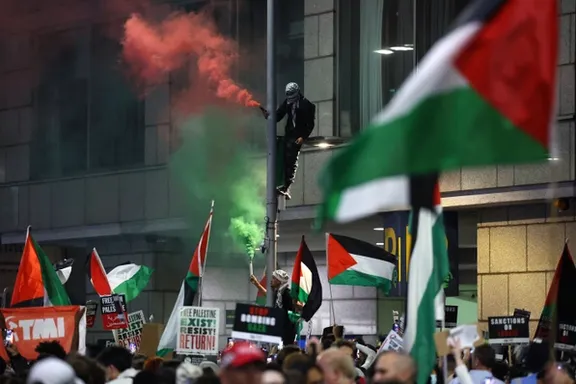
Iranian agents are stirring up unrest in the UK through Gaza protests, according to a report by the British newspaper The Times.

Iranian agents are stirring up unrest in the UK through Gaza protests, according to a report by the British newspaper The Times.
There is direct involvement of the Iranian regime through the physical presence of operatives at protests as well as through disinformation campaigns conducted online.
A third consecutive weekend of pro-Palestinian protests is being policed in London by more than 1,000 officers. Saturday's rally brought out a 100,000 crowd.
The report about Iranian involvement in protests in Britain follows repeated calls for the UK to ban Iran's Islamic Revolutionary Guard Corps. Currently, the British government is under increasing pressure to intensify its campaign against Iran.
During one of the pro-Palestinian rallies in London a British-Iranian activist who has staged a sit-in protest outside Westminster calling for the IRGC to be proscribed as a terrorist organization, was assaulted by pro-Palestinian demonstrators. Vahid Beheshti, 46, said a Hamas supporter threatened to cut his throat.
While a proscription could still happen, it is unlikely that any change will occur soon, according to The Times. Banning the IRGC would lead to "the loss of intelligence-gathering capabilities" since while the United States and Canada have both banned the IRGC, they are reportedly dependent on Britain's influence in Tehran.
However, the British government has increased sanctions, since Mahsa Amini's death in September 2022, as a response to human rights violations committed by the regime's IRGC forces and specifically pledged to enhance protection for Iranian journalists based in the UK in response to the suspension of Iran International's UK operations, which was based on advice from the London Metropolitan Police, following continued threats to its employees.

To prevent repeat of anti-regime protests like the Mahsa Amini protests, Iranian authorities have imposed a full ban on reporting about Armita Geravand’s death.
Throughout her month-long hospitalization, the media has been prohibited from reporting anything other than the official account of her death, which was first published Saturday morning by the official government news agency IRNA. Most websites Saturday only republished the IRNA report or did not cover it at all, despite its significance.
“They did not allow us report about the child of [our] motherland,” Shargh daily journalist Maryam Shokrani said in a tweet with the hashtag Armita Geravand. This, apparently, was a reference to the ban on reporting on Armita’s case when reporting on children of Gaza being killed by Israel is even encouraged and could be rewarded.
Another journalist, Saeed Arkanzadeh, tweeted that authorities have assumed the role of narrative makers, believing that they control the public opinion by creating their version of a story and amplifying it through their affiliated media to succeed in establishing it as the correct account of an incident. “is it really that simple?”, he asked.
However, authorities seem to have failed to convince most Iranians, who believe hijab enforcers were responsible for her death. Authorities claim her head injury was caused by low blood pressure and fainting.
People took to the rooftops and windows to chant Armita’s name and against the regime. “Down with the girl-killing regime!”, “Down with the Dictator”, and “Death to Khamenei” in the defiant Ekbatan neighborhood in western Tehran, the close-by Chitgar, and some other areas of the city Saturday evening.
Hours after Armita's death was announced, Tehran Prosecutor Ali Salehi initiated legal proceedings against the prominent reformist political commentator Sadegh Zibakalam and two journalists, Sara Massoumi and Milad Alavi, for their social media posts, along with the administrators of a Telegram news channel called Roozarooz.
According to the Revolutionary Guards (IRGC) linked Tasnim and Fars news agencies, the accused could be charged with lying about Armita’s death, presumably regarding its connection with hijab enforcement hijab enforcement, and for casting doubt on the official account.
Zibakalam expressed his hope that Armita's death would prompt the authorities to reconsider their stance on compulsory hijab. He stated, "How many Mahsas and young Armitas must be buried before the authorities accept that they cannot force people to wear the hijab or remove it?"
Sara Massoumi, a former reporter for the reformist Etemad newspaper, tweeted, "They say that you 'passed.' We have known the trail of blood for years. The city smells of the blood of the mistreated. Did they eventually show your mother all the footage?" She was referring to the authorities' pressure on Armita's mother to confirm the official account on television cameras.
The Geravand family, originally from the western Kurdish province of Kermanshah, is under pressure to keep her funeral as low-key as possible. The family's funeral announcement released on Saturday does not include a photo of Armita; instead, it features an image of a white candle and roses with the words "My daughter."
“The women and girls of this land are censored even after their death,” Omid Tousheh, another journalist tweeted referring to the funeral announcement.
Many other Iranians, including some celebrities, have posted condolences to Armita’s family and all Iranians, as well as their own views on the young girl’s death, on social media.
Actress Taraneh Alidoosti, who has been banned from acting for defying the hijab wrote on Instagram that her decision to stop acting in Iranian films is not because she is not allowed to but because she believes that the headscarf actresses are forced to wear in films "is stained with blood." She stated, "I will not wear the scarf that killed my sisters."
Prominent expatriate opposition figures including Nobel Laureate Shirin Ebadi, Canada-based Hamed Esmaeilion, former Crown Prince Reza Pahlavi, and the US-based activist Masih Alinejad have also condemned the state killing of Armita Geravand.
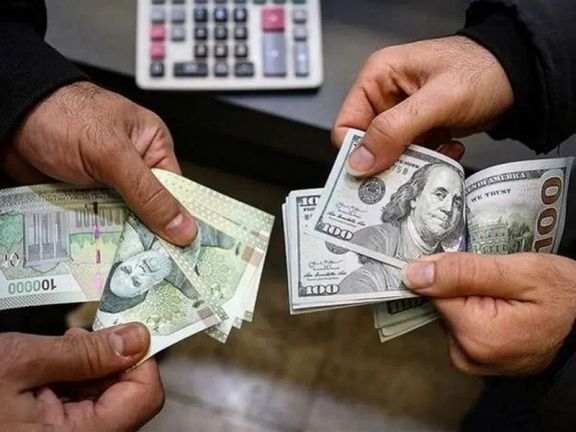
Iran’s currency and stock markets witnessed significant downward pressures on Saturday amid the continuing Gaza war and the specter of a widening conflict.
The escalation of tensions between Tehran and Washington, combined with the start of a new phase of the Israeli ground offensive in Gaza, can have significant negative effects on various aspects of Iran’s economy.
The US dollar climbed to 520,000 rials on Saturday, up from slightly over 500,000 rials during the week. The increase came after a sharp rise on the first day of the conflict between Hamas and Israel when the dollar reached 530,000 rials. However, intervention by the central bank and market stabilization measures led to a slight recovery for the rial.
Iran’s currency has declined by more than 12-fold since 2018 when the United States withdrew from the JCPOA nuclear deal and imposed economic sanctions.
In addition to the currency market, the prices of various gold coins and gold also experienced a significant surge on Saturday. Each gold coin was priced at over 300 million rials, equivalent to nearly 600 US dollars, marking an increase of more than ten million rials compared to the previous week.
The Tehran Stock Exchange's main index faced a decline of 50,000 units, losing over 2.5% of its value and falling below the 2-million-unit mark.
The economic developments come in the wake of a decrease in retail trade and the continuous outflow of real capital from the market which indicated signs of a looming recession.
However, Ehsan Khandouzi, the Minister of Economy, attributed the economic developments to foreign media reports.
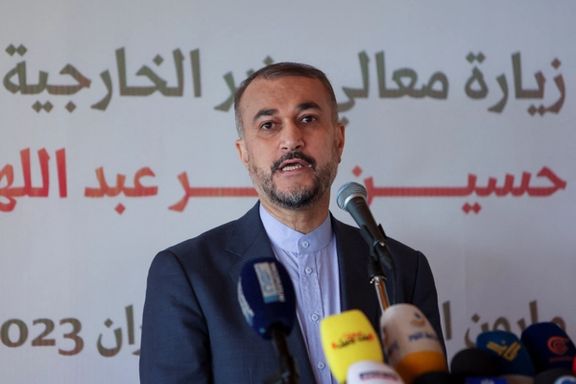
Iran's Foreign Minister, Hossein Amir-Abdollahian, has issued a warning regarding the US support for Israel, as military operations escalated in Gaza on Friday.
In an interview with Bloomberg Television from Iran's mission to the United Nations in New York this week, he expressed his concerns, saying, "The US is advising others to show self-restraint, but it has sided with Israel totally."
His statement has raised concerns about the potential escalation of the Israeli-Hamas conflict into a broader regional war. He refrained from specifying Iran's intended actions but refuted claims that Iran had directed groups in Syria and Iraq to target US forces. Instead, he placed blame on Washington for the escalation of violence following Hamas's attack on Israel.
His warning comes amid worries from Western officials that Iran-backed Hezbollah fighters in Lebanon might launch a series of attacks that could overwhelm Israeli air defenses. The US National Security Council has expressed its concerns to Israel regarding civilian casualties and collateral damage.
The situation remains highly sensitive, with Amir-Abdollahian warning, "Opening of new fronts will be unavoidable, and that will put Israel in a new situation that will make it regret its actions. This has reached the point of explosion, and anything is possible, and any new fronts can be opened up."
Iranian officials have continued to issue blistering statements on the Gaza conflict, but so far their main proxy force in the region, the Lebanese Hezbollah has not fully entered the conflict.
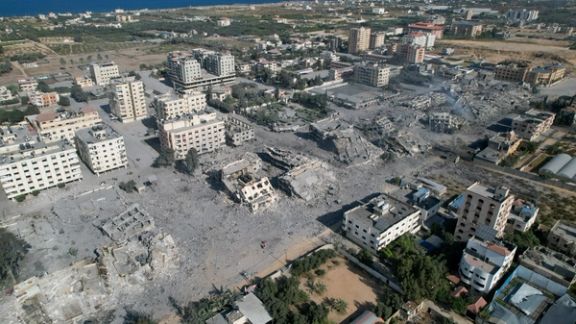
Iran continues to issue fiery statements, threatening escalation in the Gaza war, yet have not taken any concrete steps on the ground to underpin their claims.
Israel began a ground offensive into Gaza Friday night, first launching devastating air strikes. Defense Minister Yoav Gallant stated that the war against Hamas has entered a new phase, signaling the potential onset of the ground offensive.
Iran's Foreign Minister Hossein Amir-Abdollahian issued a warning regarding the United States' support for Israel during his visit to New York to attend a special session of the United Nations General Assembly. In an interview with Bloomberg Television from Iran's mission to the UN in New York, he warned, "The US is advising others to show self-restraint, but it has sided with Israel totally."
Amir-Abdollahian had set a very strict red line on October 15 regarding the Gaza ground offensive, warning that this would spiral the conflict and mutate into a regional war.
“If the Zionist entity [Israel] decides to enter Gaza, the resistance leaders will turn it into a graveyard of the occupation soldiers,” Hossein Amir-Abdollahian had told Al Jazeera.
A similar view was expressed by the IRGC Commander-In-Chief Major General Hossein Salami, who said that the Israeli army was not able to combat Hamas, stating: "The ground is the strength of Hamas, and if Hamas fights on the ground, Israelis will be swallowed up, and Gaza will serve as their burial ground."
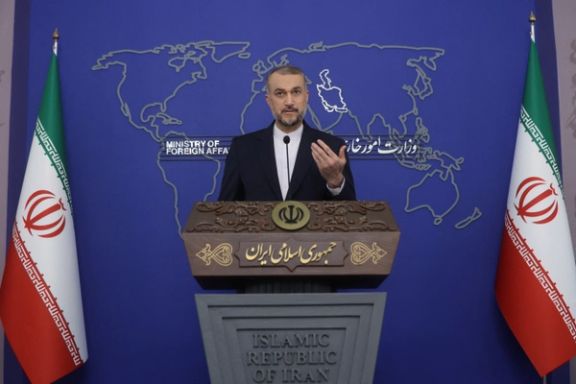
Meanwhile, the Gaza Strip continues to be bombarded by Israel's air force following an intensified attack last night that caused communication networks to go down. The Israel Defense Forces has announced the death of a senior leader behind the October 7 attack.
IDF has also issued a call for Gaza residents to evacuate prior to a wider operation in the north of the territory, saying that "the impending operation is set to neutralize the threat of Hamas with precision and intensity."
Iranian authorities had warned Israel that “unification of the fronts” would happen in case of a ground attack. Meaning that the so called “resistance front”, the alliance of Tehran’s proxy militias in the region would join forces against Israel.
Nonetheless, so far, the largest of those proxies, the Lebanese Hezbollah, has maintained a relatively low level of activity, causing Hamas officials to publicly voice their discontent.
On the surface it appears that Iran is taking a different approach, as Salman Zakir, member of Iran’s parliament for Urmia, called for a diplomatic solution rather than a military one to deal with the crisis in Gaza.
Iranian President's call with Qatar's Emir on Saturday is another indication of this strategy. In recent years, Iran and its proxies have relied heavily on Qatar as a mediator to negotiate with Western governments. The Qatari government has also been successful recently in negotiating the release of hostages on behalf of Hamas, which maintains its headquarters in Doha.
It appears that the metaphor analysts used to explain Israel's strategy against militants in the Gaza Strip, "mowing the grass," has ceased to be relevant since more than 1,400 civilians and hundreds of soldiers have been slaughtered by Hamas terrorists after the group's surprise attack on Israel.
It is possible that Israel has abandoned the use of patient deterrence in the region and is determined to actively eliminate militants. Consequently, they may not adhere to the principle of proportionate retaliation against Hezbollah. In an interview with Iran International, the Israeli UN ambassador Gilad Erdan had said: “The Ayatollah regime is the head of the octopus and Hamas is only one of its tentacles. Once we’re finished with this war, we will address this global threat that Iran poses."
In Washington's recent swift retaliation strike against Iran-linked sites in Syria following assaults on US CENTCOM forces in Syria and Iraq, Iran did not benefit from the usual tactic of no retaliation. Clearly, the United States supports Israel completely, and a full-scale war may not be in the best interest of Iran. Moreover, the regime's usual diversionary tactic may be ineffective in this case, at least at this point.
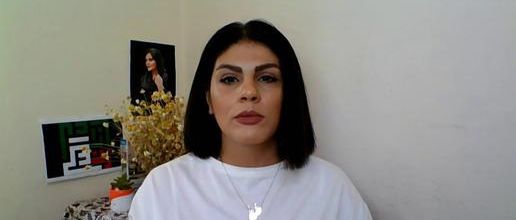
Shilan Mirzaee, a human rights and political activist, is in danger of being deported to Iran because of increased pressure on Iranian asylum seekers in Turkey.
Mirzaee was recently detained in Izmir and transferred to the Bandirma deportation center in northern Turkey.
During an audio message on Thursday, Ms Mirzaee described her situation and stated that if she were to be returned to Iran, she would be subjected to severe punishment.
Attempts to deport her are being made despite her claim that she has "the approval of the United Nations and the Immigration Police" in her file and that she has not engaged in any activities against the Turkish government.
Authorities have not explained why this activist was arrested and transferred to the detention center.
In recent years, the situation of Iranian political and civil refugees living in Turkey has deteriorated.
Shilan Mirzaee has described threats made by individuals associated with the Iranian Embassy, including two women who she alleges were attempting to kidnap her, and threats made against her son in front of school.
Iran International reported in August about the situation of an Iranian refugee in the Aydin Removal Center who was being physically and mentally tortured by the camp director.
He explained that the officials of the camp keep the asylum seekers under the sun so that they will sign the deportation papers to Iran.
Last year British television channel ITV reported that affiliates of the Iranian regime are threatening to kidnap political refugees in Turkey.
An asylum seeker was quoted asserting that Iran has become very adept at kidnapping and killing opponents.